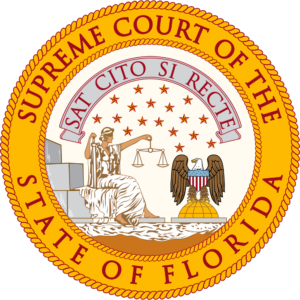Samantha Joseph, Daily Business Review
May 27, 2015
Condo association boards hoping to cut legal fees by performing some everyday tasks in-house will need to reconsider after the Florida Supreme Court reaffirmed an earlier opinion that these duties constitute practicing law without a license.
Still reeling from the last housing crash that left some filing for bankruptcy to remain solvent while scrambling to collect dues amid a foreclosure crisis, associations got their latest piece of bad news when the Supreme Court this month maintained a position that requires attorney assistance for many condo association tasks.
The court approved a proposed advisory opinion from its Standing Committee on the Unlicensed Practice of Law on May 14 after the Florida Bar petitioned to reexamine the original opinion that dates back to 1996.
The Bar’s petition asked for confirmation that about 20 tasks require the services of qualified attorneys, and therefore bar community association managers and other non-lawyers from performing them.
The list includes several responsibilities, such as drafting liens or documents showing satisfaction of lien claims, preparing construction commencement notices and determining the timing, method and form for giving meeting notices.
“CAMs can perform ministerial tasks,” Haber Slade partner David Haber said in response to the Supreme Court’s findings. “If it goes beyond that and requires analysis and legal interpretation, they need to consult with association counsel.”
‘Once You See Gray’
The Bar had already scored two victories on the issue in 1996 and again in 2012, but its latest petition asked the court whether community association managers could perform 14 additional duties, like preparing assessment certificates in foreclosures, determining the number of owners’ votes needed to establish a quorum and drafting amendments to a condo association’s covenants, bylaws and articles of incorporation.
“Some of these things aren’t that complicated, but I understand the reasoning,” said Glen Waldman, managing partner at Heller Waldman in Miami. “Things can go wrong if you get confused, especially with condos, which are a hot bed for litigation. You really want to ensure that it goes well, and that’s what lawyers are supposed to do.”
Some community association managers lobbied for the ability to handle what they saw as routine administrative tasks, while critics challenged the Bar’s move as a protectionist ploy to ensure that already struggling associations remain reliant on attorneys.
But other observers say the clear demarcation of duties helps condo boards avoid costly mistakes. It’s one thing to review accounting files to determine when to issue a lien, attorneys say, but determining the parties in a foreclosure action or answers to homeowner defenses require a whole different skill set.
“There are issues, both big-picture and focused, that can enter in the realm of legal advice,” said Manuel L. Crespo Jr., partner at Sanchez-Medina Gonzalez Quesada Lage Crespo Gomez & Machado in Coral Gables. “Do we want to have a non-lawyer giving advice to the association as to whether they should proceed? In my view, once you see gray, it’s time to stop and consult your lawyer.”
Pressure From Boards
Donna DiMaggio Berger, a shareholder in Becker & Poliakoff’s Fort Lauderdale office, has spent about two decades working with community association managers and managing companies across Florida. She said managers often understand their job limits and the risks inherent in legal analysis, but succumb to pressure from their cash-strapped employers.
“I was really surprised where the focus was laid,” Berger said. “To me it looked like a solution in search of a problem. The problem I’ve witnessed was always with boards. I’ve found many more board members who played lawyer than community managers who did.”
“The bigger problem rests with the board members. They’re the ones who are more likely to make these kinds of decisions,” Berger added. “Often, a board puts pressure on the manager because of price points. They think they’re going to load up the manager with this work, but that’s not to the management company’s or the association’s benefit.”
This month, the Supreme Court reiterated that only licensed attorneys can perform the following tasks:
- draft a claim of lien and satisfaction of claim of lien;
- prepare a notice of commencement;
- determine the timing, method and form of giving notices of meetings;
- determine the votes necessary for certain actions by community associations;
- address questions asking for the application of a statute or rule;
- advise community associations whether a course of action is authorized by statute or rule;
- prepare a certificate of assessments due once a delinquent account is turned over to the association’s lawyer;
- prepare a certificate of assessments due once a foreclosure against the unit has commenced;
- prepare a certificate of assessments due once a member disputes in writing the amount owed;
- draft amendments (and certificates of amendment that are recorded in the official records) to declaration of covenants, bylaws and articles of incorporation when members have to vote on these documents;
- determine the number of days to be provided for statutory notice;
- modify limited-proxy forms promulgated by the state;
- prepare documents concerning the right of the association to approve new prospective owners;
- determine affirmative votes needed to pass a proposition or amendment to recorded documents;
- determine the number of owners’ votes needed to establish a quorum;
- draft pre-arbitration demand letters;
- prepare construction lien documents;
- prepare, review, draft and have substantial involvement in the preparation and execution of contracts, including construction, management and cable television contracts;
- identify, through the review of title instruments, the owners to receive pre-lien letters; and
- oversee any activity that requires statutory or case law analysis to reach a legal conclusion.




